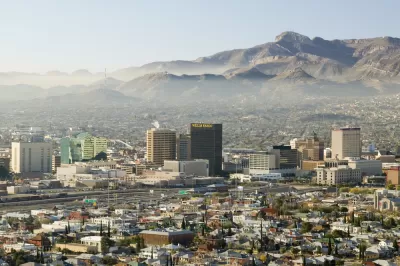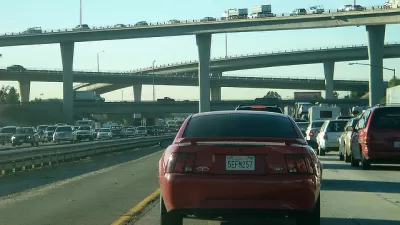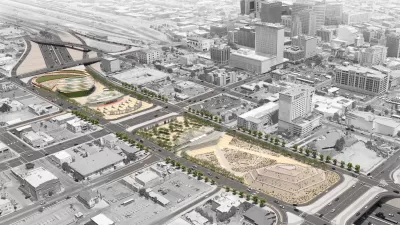An independent review of TxDOT's proposed expansion of I-10 through downtown El Paso highlights several flaws and a price tag close to $800 million.

A third-party review of the Texas Department of Transportation's plan to expand Interstate 10 through downtown El Paso "found expanding I-10 in the Downtown area would not reduce congestion, instead it would bring more short local trips onto the freeway," reports Jennifer Cuevas.
"For his review, Norman Marshall, president of Smart Mobility Inc., looked at traffic data, speed count and the TxDOT El Paso Regional Modeling Files for the 2045 Metropolitan Transportation Plan." This doesn't surprise transportation planners who warn that building more lanes simply induces more driving and increased congestion. "Of the two additional lanes TxDOT has proposed, one would serve as a general purpose lane and the other as a transit-adaptive lane," Cuevas writes. "The problem with the transit-adaptive lane is TxDOT has not explained in detail what their purpose would be, according to Marshall."
"Rather than expanding, one of Marshall’s recommendations is to consider a street collector distributor concept to the west of Downtown." This approach would "keep the local traffic off the road, you keep it on the streets and therefore you let the freeway operate as an express facility," writes Marshall in the report. The report also adds that "The major issue with the I-10 Segment 2 Expansion Proposal review is it’s based on the Metropolitan Transportation Plan for 2045, instead of the MTP 2050 plan."
FULL STORY: Proposed expansion in I-10 Downtown could cost over $780 million

Planetizen Federal Action Tracker
A weekly monitor of how Trump’s orders and actions are impacting planners and planning in America.

Chicago’s Ghost Rails
Just beneath the surface of the modern city lie the remnants of its expansive early 20th-century streetcar system.

San Antonio and Austin are Fusing Into one Massive Megaregion
The region spanning the two central Texas cities is growing fast, posing challenges for local infrastructure and water supplies.

Since Zion's Shuttles Went Electric “The Smog is Gone”
Visitors to Zion National Park can enjoy the canyon via the nation’s first fully electric park shuttle system.

Trump Distributing DOT Safety Funds at 1/10 Rate of Biden
Funds for Safe Streets and other transportation safety and equity programs are being held up by administrative reviews and conflicts with the Trump administration’s priorities.

German Cities Subsidize Taxis for Women Amid Wave of Violence
Free or low-cost taxi rides can help women navigate cities more safely, but critics say the programs don't address the root causes of violence against women.
Urban Design for Planners 1: Software Tools
This six-course series explores essential urban design concepts using open source software and equips planners with the tools they need to participate fully in the urban design process.
Planning for Universal Design
Learn the tools for implementing Universal Design in planning regulations.
planning NEXT
Appalachian Highlands Housing Partners
Mpact (founded as Rail~Volution)
City of Camden Redevelopment Agency
City of Astoria
City of Portland
City of Laramie





























